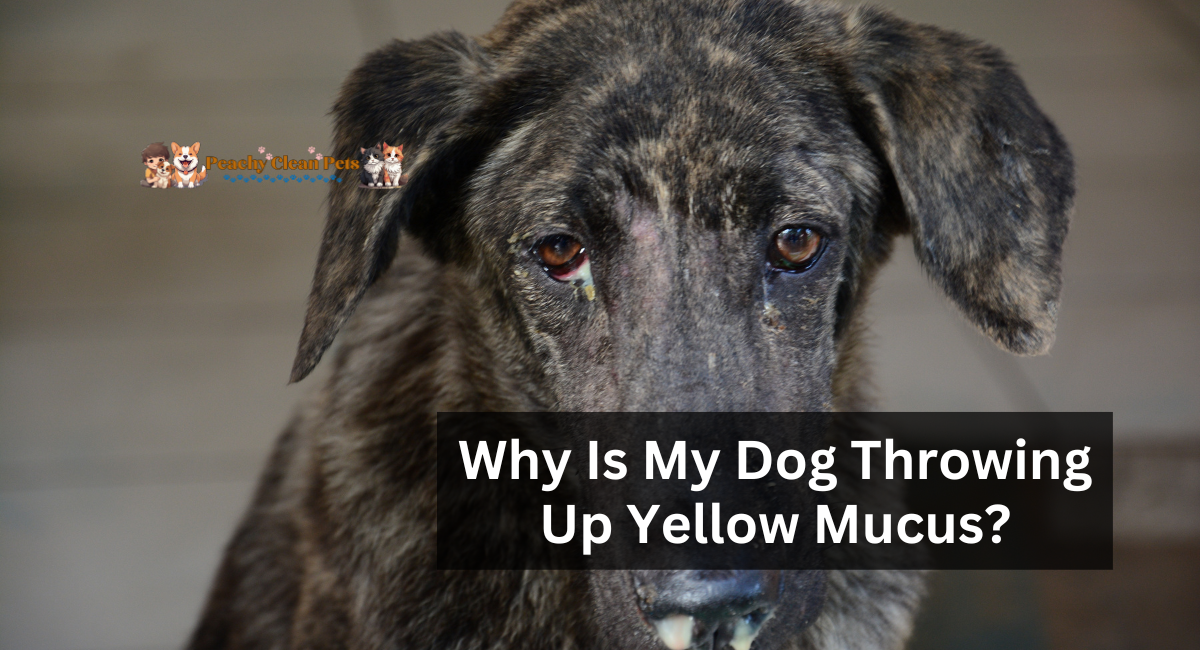Nothing rouses one more quickly than the sound of their furry child heaving. You hasten to their aid, only to discover a substantial accumulation of vomit that is yellow. Although isolated yellow dog regurgitation may seem inconsequential, its recurrence or co-occurrence with additional symptoms may warrant greater attention.
Virtually every owner of a furry four-legged dog is familiar with the sound of a dog vomiting or wheezing. It is a distressing and nerve-wracking sound, particularly when discovering a mound of yellow, carbonated, aqueous, viscous liquid. There are several potential causes for yellow bile in your dog’s bowel, and some of them may be cause for concern.
What Is Yellow Mucus?
Yellow regurgitation in canines is typically indicative of bile content. Bile is a biliary secretion retained in the gallbladder before utilization within the body. The liver generates it. Bile is expelled into the small intestine alongside a dog’s meal to aid digestion.
What Causes Dog Vomit?
Vomiting is the body’s innate mechanism for eliminating hazardous substances or alleviating abdominal discomfort. A dog that vomits may do so for a variety of reasons:
- Foreign or toxic object ingestion
- Motion sickness
- Gastrointestinal issues
- Bacterial or parasitic Infections
- Stress
- Additional underlying health problems
It is crucial to remember that dog defecation could be a minor problem, such as when your dog consumes food too quickly and his stomach is unable to keep up. Nevertheless, persistent vomiting that is accompanied by additional worrisome symptoms such as lethargy, diarrhea, blood in the vomit, weight loss, or prolonged vomiting constitutes a significant issue.
Consult your veterinarian to ascertain the underlying cause and administer the appropriate treatment to your companion if this occurs.
Why Is My Dog Throwing Up Yellow Mucus?
Although there are numerous potential causes for a dog’s vomiting, the presence of bile helps to eliminate them. These consist of:
1. They Have An Empty Stomach
When your dog has not eaten for an extended period, bile reflux from the small intestine into the stomach. Your dog may vomit due to this irritation to the gastrointestinal lining.
The medical term for this highly prevalent cause of yellow regurgitation in canines is bilious vomiting syndrome.
Although some canines have a lengthier tolerance for an empty stomach than others, bilious vomiting typically occurs overnight or early in the morning, before breakfast.
Although BVS resembles acid reflux in humans, it manifests in a more distal digestive tract region. In contrast to acid reflux, which causes stomach acid to reflux into the esophagus, bile reflux from the small intestine into the stomach characterizes BVS.
BVS is typically readily remedied by distributing the dog’s daily food allowance into multiple smaller meals over the day instead of feeding the dog one or two meals. Additionally, feeding your dog a light supper just before bedtime will shorten the time his stomach remains empty at night.
2. Gastrointestinal Issues
Canine yellow regurgitation is a symptom of numerous gastrointestinal disorders. Frequently, You may detect further indications such as diarrhea, appetite loss, or lethargy in conjunction with this.
Illnesses that affect canines include inflammatory bowel disease (IBD), irritable bowel syndrome (IBS), liver disease, and malignancy.
Blood tests, X-rays, and scans are a few of the diagnostic procedures that your veterinarian would likely be required to conduct to identify gastrointestinal disease.
3. Pancreatitis
It is a potentially fatal and excruciating disease that induces inflammation of the pancreas. It can be caused by consuming oily foods, but it can also occur for unknown reasons.
Symptoms other than recurrent vomiting consist of abdominal pain, lethargy, and diarrhea on occasion. The management of pancreatitis entails administering supportive care, which may include analgesics, opioids, and gut-protecting agents.
The severity of your dog’s condition may also necessitate hospitalization for the administration of intravenous fluids (a flow) and additional intensive nursing care.
4. Gastrointestinal Obstruction
A dog may experience obstructions in the digestive tract if it consumes an indigestible foreign object, such as a bone, cloth, stone, or toy. While the possibilities are virtually limitless, certain canines will ingest anything.
Notify your veterinarian immediately if you suspect that your dog has consumed an unapproved substance, as a gastrointestinal obstruction that remains untreated can be fatal.
Typically, surgical removal of the objectionable object is necessary, followed by a hospital stay for your dog’s recovery.
5. Food Allergies
Yellow vomit in canines is occasionally the result of an intolerance or allergy to a particular food. Substances your canine companion is allergic to may induce intestinal lining irritation, subsequently precipitating regurgitation.
Frequently, individuals will exhibit additional symptoms, including diarrhea and pruritic skin. A frequent indication of a food allergy in canines is excessive licking or chewing of their feet, especially following a meal.
You can resolve the problem by eliminating the problematic constituent from your dog’s diet. However, identifying the specific food to which your dog is allergic can be challenging, particularly given that numerous dogs exhibit allergies to multiple food ingredients.
A diet trial, in which the majority of ingredients are removed from your dog’s diet and reintroduced gradually to determine whether they cause a reaction, may be necessary in such situations. Veterinary prescription regimens are accessible to assist with this matter. You can obtain further information regarding these from your veterinarian.
6. Intestinal Parasites
A significant worm burden may induce intestinal irritation in canines, potentially producing yellow bile.
Establishing a consistent deworming regimen for your dog and consulting your veterinarian regarding the most appropriate treatments for your pet is imperative.
While the factors above contribute to yellow bile ingestion in dogs, it is essential to consider that numerous less frequent causes also exist. Although yellow vomit on occasion in canines is likely not cause for concern, it is always prudent to consult a veterinarian. It is particularly true if, despite your care at home, they continue to vomit or if they appear otherwise ill.
Thank you for reading…..
